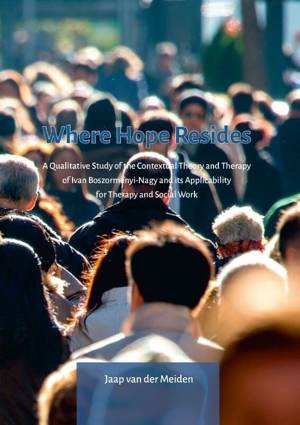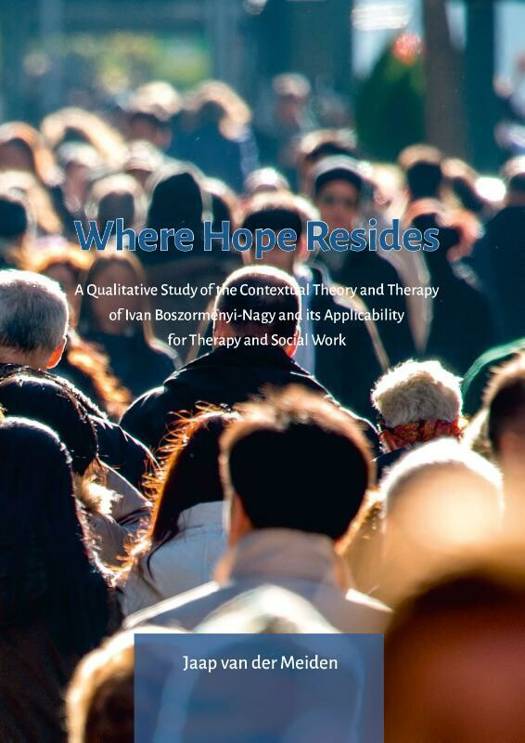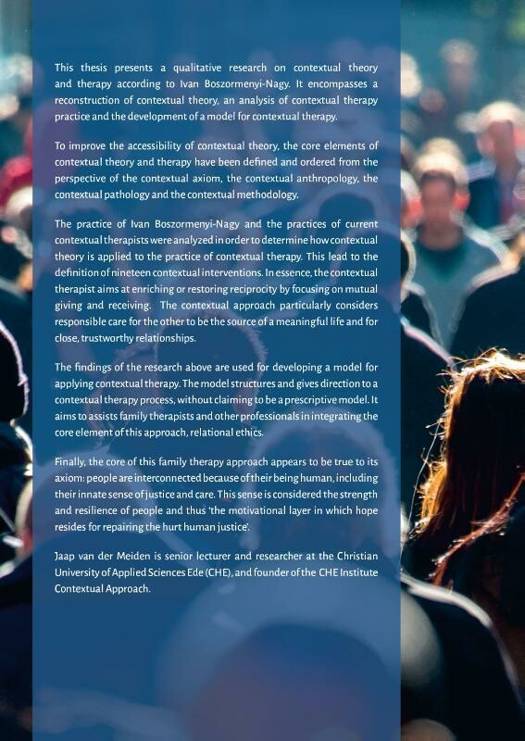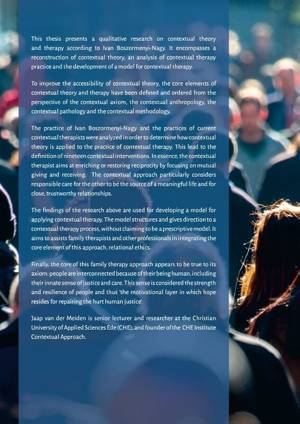
Bedankt voor het vertrouwen het afgelopen jaar! Om jou te bedanken bieden we GRATIS verzending (in België) aan op alles gedurende de hele maand januari.
- Afhalen na 1 uur in een winkel met voorraad
- In januari gratis thuislevering in België
- Ruim aanbod met 7 miljoen producten
Bedankt voor het vertrouwen het afgelopen jaar! Om jou te bedanken bieden we GRATIS verzending (in België) aan op alles gedurende de hele maand januari.
- Afhalen na 1 uur in een winkel met voorraad
- In januari gratis thuislevering in België
- Ruim aanbod met 7 miljoen producten
Zoeken
Where Hope Resides
A Qualitative Study of the Contextual Theory and Therapy of Ivan Boszormenyi-Nagy and its Applicability for Therapy and Social Work
Jakob Hendrik van der Meiden
Paperback | Engels
€ 35,00
+ 70 punten
Omschrijving
This thesis presents a qualitative research on contextual theory and therapy according to Ivan Boszormenyi-Nagy. It encompasses a reconstruction of contextual theory, an analysis of contextual therapy practice and the development of a model for contextual therapy.
To improve the accessibility of contextual theory, the core elements of contextual theory and therapy have been defined and ordered from the perspective of the contextual axiom, the contextual anthropology, the contextual pathology and the contextual methodology.
The practice of Ivan Boszormenyi-Nagy and the practices of current contextual therapists were analyzed in order to determine how contextual theory is applied to the practice of contextual therapy. This lead to the definition of nineteen contextual interventions. In essence, the contextual therapist aims at enriching or restoring reciprocity by focusing on mutual giving and receiving. The contextual approach particularly considers responsible care for the other to be the source of a meaningful life and for close, trustworthy relationships.
The findings of the research above are used for developing a model for applying contextual therapy. The model structures and gives direction to a contextual therapy process, without claiming to be a prescriptive model. It aims to assists family therapists and other professionals in integrating the core element of this approach, relational ethics.
Finally, the core of this family therapy approach appears to be true to its axiom: people are interconnected because of their being human, including their innate sense of justice and care. This sense is considered the strength and resilience of people and thus ‘the motivational layer in which hope resides for repairing the hurt human justice’.
Jaap van der Meiden is senior lecturer and researcher at the Christian University of Applied Sciences Ede (CHE), and founder of the CHE Institute Contextual Approach.
To improve the accessibility of contextual theory, the core elements of contextual theory and therapy have been defined and ordered from the perspective of the contextual axiom, the contextual anthropology, the contextual pathology and the contextual methodology.
The practice of Ivan Boszormenyi-Nagy and the practices of current contextual therapists were analyzed in order to determine how contextual theory is applied to the practice of contextual therapy. This lead to the definition of nineteen contextual interventions. In essence, the contextual therapist aims at enriching or restoring reciprocity by focusing on mutual giving and receiving. The contextual approach particularly considers responsible care for the other to be the source of a meaningful life and for close, trustworthy relationships.
The findings of the research above are used for developing a model for applying contextual therapy. The model structures and gives direction to a contextual therapy process, without claiming to be a prescriptive model. It aims to assists family therapists and other professionals in integrating the core element of this approach, relational ethics.
Finally, the core of this family therapy approach appears to be true to its axiom: people are interconnected because of their being human, including their innate sense of justice and care. This sense is considered the strength and resilience of people and thus ‘the motivational layer in which hope resides for repairing the hurt human justice’.
Jaap van der Meiden is senior lecturer and researcher at the Christian University of Applied Sciences Ede (CHE), and founder of the CHE Institute Contextual Approach.
Specificaties
Betrokkenen
- Auteur(s):
- Uitgeverij:
Inhoud
- Aantal bladzijden:
- 222
- Taal:
- Engels
Eigenschappen
- Productcode (EAN):
- 9789463806671
- Uitvoering:
- Paperback

Alleen bij Standaard Boekhandel
+ 70 punten op je klantenkaart van Standaard Boekhandel
Beoordelingen
We publiceren alleen reviews die voldoen aan de voorwaarden voor reviews. Bekijk onze voorwaarden voor reviews.











